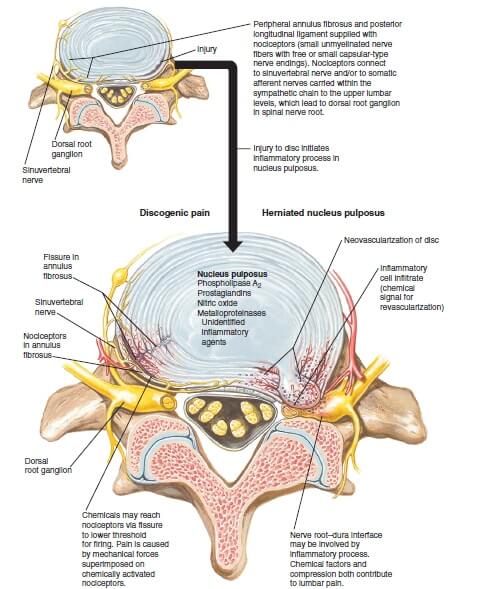Discogenic pain describes pain that arises from a failing intervertebral disc. Discs are the gel like cushions between the bones of the spine that help to bear the forces of walking and moving. As the body ages, the discs lose their normal water content and become degenerative and brittle. These degenerative discs can cause some slight movements or instability in the spine, which can lead to episodes of muscle spasm as the muscle tighten to support the movement. Usually a day or two of rest will help the back pain of acute muscle spasm. Degenerative discs can also cause pain by impinging on nerves that exit close to the spine resulting in Sciatica. It should be noted that not all degenerated discs cause pain. In fact, you can have a narrowed or herniated disc that does not cause discogenic pain at all. It is dependent on the impact the disc changes have on all surrounding tissues.
Many different patient groups can experience discogenic pain. However, it tends to occur in middle age more frequently than in older adults. This is because, as the disc degenerates, the spine develops ways to compensate for the failing disc. Although you may have considerable pain in your middle years, by the time you reach older adulthood the spine has already employed strategies to stabilize the spine and reduce pain. Middle aged patients who meet certain criteria are more likely to have discogenic pain than others. For instance, patients who participate in contact sports can cause the disc to degenerate because of the pressures and impacts of the game. Poor ergonomics can also contribute to discs breaking down because this means the spine has to compensate for awkward body mechanics. Those who carry extra weight and those who have professions that require constant heavy lifting are also at risk due to the repetitive stress of both conditions.


This information is for educational purposes only and is NOT intended to replace the care or advice given by your physician. Always seek the advice of your physician or other qualified health provider before starting any new treatment or with any questions you may have regarding a medical condition. For more information see our Medical Disclaimer.